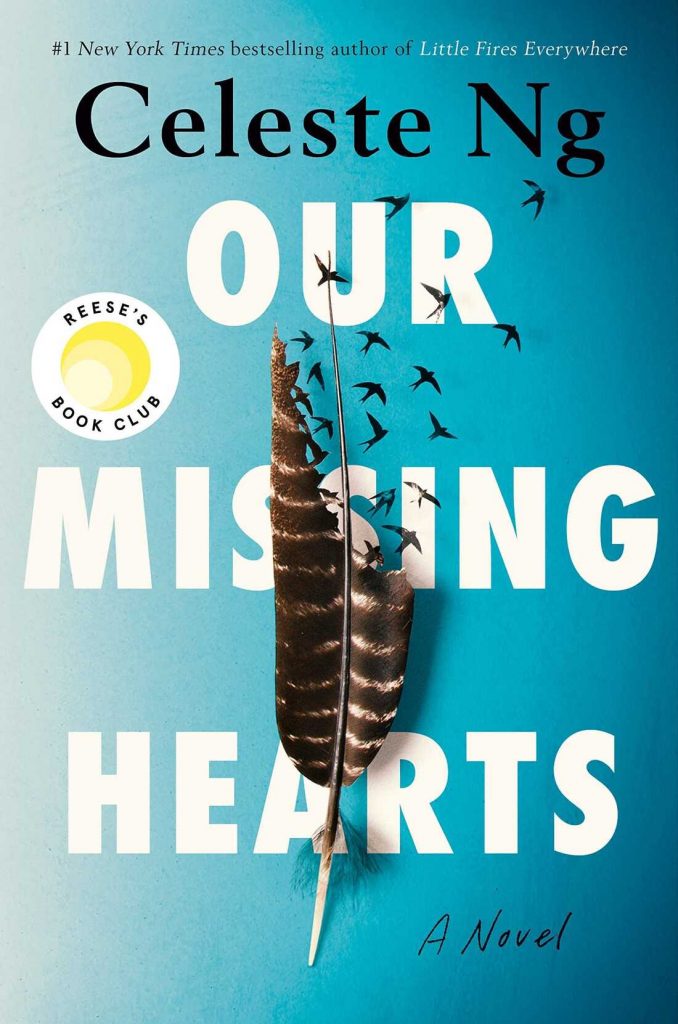
Celeste Ng is back with her boldest novel yet.
After the success of “Everything I Never Told You” and “Little Fires Everywhere,” the #1 New York Times bestselling author has created a chillingly accurate American dystopia in “Our Missing Hearts: A Novel.” Her near-future version of the United States offers searing parallels to the COVID-19 pandemic, racial tensions and the rise of anti-Asian hate.
Despite opening with a seemingly simplistic portrayal of injustice and indoctrination, “Our Missing Hearts: A Novel” refuses to stay one-note. In true Ng fashion, the novel slowly builds into a complex, subtly powerful exploration of family dynamics, the beauty of words and, above all, a multifaceted criticism of America today.
The novel opens with Noah “Bird” Gardner. Twelve-year-old Bird lives with his father, a former linguistics professor, in a hellish version of Cambridge, Massachusetts. This America, recovering from an economic disaster known as “the Crisis,” is authoritarian and xenophobic. At school, Bird is indoctrinated with propaganda about PACT — the Preserving American Culture and Traditions Act. His friend, Sadie, a displaced child of dissident parents, has disappeared.
His Chinese American mother disappeared too, three years ago. His only connection to her is a line from her famous poem, now used as a symbol of resistance. Then, he receives a letter from her, containing only drawings of cats.
In his search for his mother, Bird weaves through underground resistance networks. He discovers secrets in a Japanese folktale. He explores the etymology of Chinese characters and follows the trail of a poem that might lead to his mother. All these disparate parts intertwine, creating a very humane portrait of injustice.
However, “Our Missing Hearts: A Novel” isn’t only about Bird’s quest. First and foremost, Ng’s dystopia offers chilling parallels to the rise of anti-Asian hate. Elderly Asian people being kicked, shoved and spat on — none of these hate crimes in the novel are fiction. Blaming economic disaster on China hardly seems like fiction, either. It calls most strongly to former President Donald Trump’s anti-Chinese rhetoric, which labeled COVID-19 as the “Chinese virus.”
In addition to hate crimes, the Crisis is marked by the separation of children and families. The government targets dissident parents and then relocates their children, placing them into foster homes. This narrative carries echoes of the Japanese American incarceration during WWII and, more recently, the separation of families at the U.S. border.
The protests for the missing children also resemble the Black Lives Matter (BLM) movement. Just like BLM supporters, protestors in the novel repeat victims’ names so that they are not forgotten.
Moreover, the dystopia parallels COVID-19 in America. Ng deftly ties together the threads that make up our pandemic experience — loneliness, grief, racial tension and economic struggle, among others. “The Crisis,” like COVID-19, is a universal crisis that isn’t so universal at all. It exacerbates economic disparity, heightens racial strife and sparks violent protests. It tests the morality of our government and the morality of ourselves. It is tiring. When people hear enough news stories about injustice, they stop caring. They want to move on.
“Our Missing Hearts: A Novel” wraps up all these experiences into one, though not initially. The beginning of the novel reads simplistically. References to PACT are frequent, as are descriptions of violent protests and Bird’s homework espousing PACT rhetoric. However, the themes become more complicated as the novel develops.
The second half of the novel further explores the complexity of familial relationships. Like her previous novels, this is where Ng truly excels. As Bird conducts an investigation through Cambridge libraries, Ng reveals Bird’s complex relationship with his father — a white man who will punch a stranger for calling his son a racial slur, yet pretends that his missing wife no longer exists. Then there is his mother. Radical, violent, dangerous — this is what the media thinks of her. But Bird only remembers a gentle woman who used to tell him Chinese folk tales.
Though thematically simplistic at first, “Our Missing Hearts: A Novel” develops into a complex novel that opens up questions about America today. The novel portrays contrasting perspectives of resistance ranging from aggressive to nonviolent, but does not endorse either.
Could “Our Missing Hearts: A Novel” have taken a firmer stance? Possibly. The novel is complex enough, however, to make us scrutinize the state of our country. It makes us look more critically at our relationships with each other, within families and across racial lines. It begs us to remember past injustices, to do better, and above all, to speak out — in any way that we can.
Rating: 4.5/5 stars


